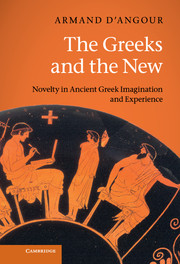Book contents
- Frontmatter
- Contents
- Acknowledgements
- Introduction
- Chapter 1 New, new, new
- Chapter 2 Loosening the grip of the past
- Chapter 3 The transformations of Kaineus
- Chapter 4 Old and new
- Chapter 5 Nothing new under the sun
- Chapter 6 The birth of Athena
- Chapter 7 Inventions of Eris
- Chapter 8 The newest song
- Chapter 9 Constructions of novelty
- Chapter 10 So what's new?
- References
- General index
- Index of Greek terms
- Index locorum
Chapter 2 - Loosening the grip of the past
Published online by Cambridge University Press: 07 September 2011
- Frontmatter
- Contents
- Acknowledgements
- Introduction
- Chapter 1 New, new, new
- Chapter 2 Loosening the grip of the past
- Chapter 3 The transformations of Kaineus
- Chapter 4 Old and new
- Chapter 5 Nothing new under the sun
- Chapter 6 The birth of Athena
- Chapter 7 Inventions of Eris
- Chapter 8 The newest song
- Chapter 9 Constructions of novelty
- Chapter 10 So what's new?
- References
- General index
- Index of Greek terms
- Index locorum
Summary
The more definite a mind is, the more it needs the new.
Elias CanettiAristotle's second book of Politics offers a useful starting-point for the investigator who seeks to distinguish Greek attitudes to novelty in different spheres of activity. He begins by outlining and criticising various theories of ‘ideal states’ starting with Plato's Republic and Laws, and examines in particular the latter's arguments for owning property, wives and children in common. Seemingly new ideas of this kind, he suggests, may already have been tested and found wanting in the past:
We are bound to pay some regard to the long past and the passage of the years, in which these things [advocated by Plato as new discoveries] would not have gone unnoticed if they had been really good. Almost everything has been discovered (heurētai) already: though some of the things discovered have not been co-ordinated, and some, though known, are not put into practice.
Aristotle gives guarded praise to his teacher's clever if impracticable proposals: ‘All the writings of Plato are original: they show ingenuity (kompson), novelty of view (kainotomon), and a spirit of inquiry (zētētikon). But perfection in everything is perhaps a difficult thing.’ No other thinker, he notes,
has proposed such novelties (kekainotomēken) as community of wives and children or common meals for women: on the contrary, thinkers have rather started from the immediate necessities of life. Thus there are some who hold that the proper regulation of property is more important than any other object, because this is the issue on which civil discords always arise. Phaleas of Khalkedon was the first to suggest regulation of property for the purpose of preventing discord.
After rejecting the ideas of Phaleas (an otherwise unknown political thinker of the late fifth century bce), Aristotle goes on to discuss the ideas of the flamboyant fifth-century city-designer, Hippodamos of Miletos, ‘the first man without practical experience of politics who attempted to handle the theme of the best form of constitution’. Hippodamos also proposed that a reward should be offered for ‘inventions of benefit to the state’, and anticipated the Athenian law that the children of men who died in battle should be supported at public expense.
- Type
- Chapter
- Information
- The Greeks and the NewNovelty in Ancient Greek Imagination and Experience, pp. 36 - 63Publisher: Cambridge University PressPrint publication year: 2011

